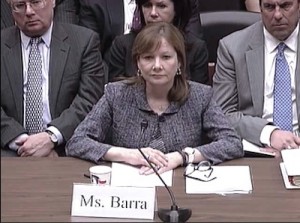General Motors CEO Mary Barra’s spent much of her time during her testimony on Capitol Hill today saying GM was a different company now with a focus on safety.
“I would say, in general, we’ve moved from a cost culture since the bankruptcy to a customer culture,” she said, adding the focus on the customer includes ensuring GM vehicles are safe.
Her hearing before the House Oversight and Investigations Subcommittee saw her pressed on a variety of issues related to the company’s recall of more than 2.5 million vehicles due to a faulty ignition switch, but it was more civil than the lambasting former GM CEO Rick Wagoner received when he testified before Congress several years ago.
The subcommittee members, which is tasked with finding out who and what people at GM knew and when, largely focused on three issues:
- Did GM sacrifice safety at the expense of cost
- Is GM going to find a way to compensate the victims involved in the crashes of recalled vehicles
- Will anyone be fired for approving the changes without informing senior management or federal officials
Barra deflected most of the questions about what people knew and when it was known, saying she was awaiting the results of an ongoing independent investigation. She noted the company hired former U.S. Attorney General Anthony Valuskas to conduct the investigation. Once the investigation is complete, the company would then take steps to rectify problems found during the query.
“He has free reign to go where the facts take him,” she testified. “The facts are what the facts are.”
Barra was asked repeatedly how GM balances safety and cost in the design and manufacture of its vehicles.
“The cost is not the issue that we look at to see what will make the vehicle safe,” she said in her testimony. “We don’t look at cost. If there is a safety issue, we make the change.”
Barra also confirmed that no employees have been fired at this point related to the issue, but reminded that the company was waiting for the report to be completed before taking any action.
“We will takes steps and hold people accountable,” she testified.
Members of the committee took note that GM hired Kenneth Feinberg – who oversaw victims’ compensation funds for the 9/11 attacks, the Boston Marathon bombing and the BP Gulf oil spill to “explore and evaluate options” for a compensation fund.
Barra was asked several times if and when the company will set up fund and if Feinberg would be administering it.
(GM studying “options” for ignition switch victims fund. For more, Click Here.)
“We’ve hired Mr. Feinberg to help us assess the situation,” Barra said. “We’ve just hired him and begin working with him on Friday. We’re going to work with him to determine what the right course of action is.”
When pressured further about whether or not Feinberg will be handling a compensation fund, Barra said “We haven’t made any decisions on that.”
(Click Here to get further details about March auto sales.)
Barra will face separate hearings on the House and Senate sides of the Capitol this week but the subject is the same: when did it learn about the problem with faulty ignition switches now linked to at least 13 deaths and 31 crashes, and why did it take so long to respond to the deadly problem?
(To see why GM’s Barra is battling a tough history during hearings, Click Here.)
With the addition of more than 900,000 vehicles late last week, GM has now recalled about 2.6 million cars and crossovers equipped with the switch which can inadvertently turn off, stalling out a vehicle’s motor and disabling its airbag system.
The maker isn’t the only one taking heat, however. The National Highway Traffic Safety Administration is also under fire for not having caught the problem earlier and for failing to press GM for a recall.

